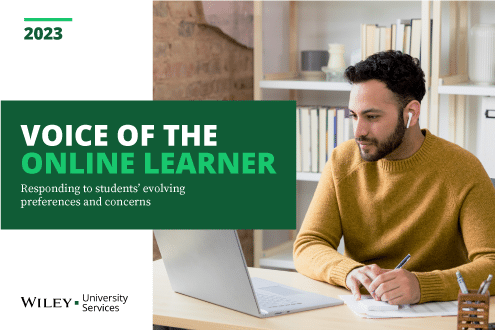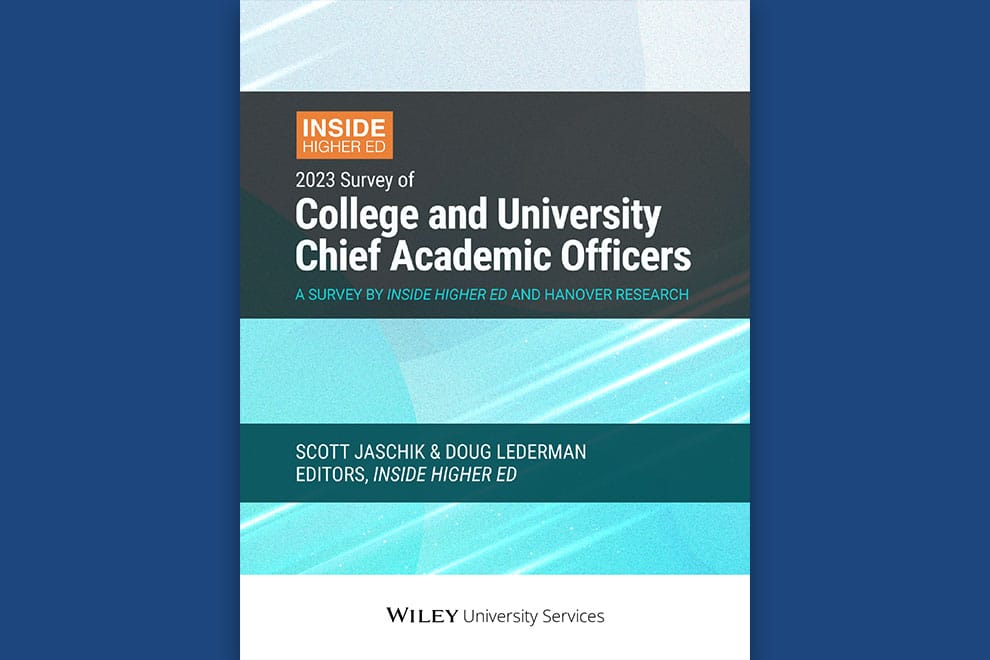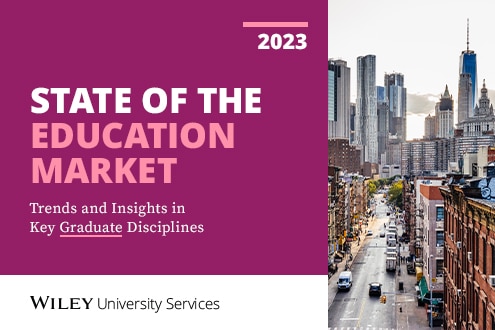Each learner has lived a unique experience that shaped their perspective and learning needs. At Georgetown University, the faculty not only embrace those differences — they commit to inclusive pedagogy, developing coursework that appeals to a diverse student population.
Georgetown takes a “learner-centered and equity-focused” approach to inclusive pedagogy. Learners and instructors come together in a “supportive and open environment that fosters social justice and allows each individual to be fully present and feel equally valued.”
Students of color may feel present and valued in inclusive classrooms because they ”see themselves reflected in class content,” according to an article by Jasmine Roberts-Crews, a strategic communication educator at The Ohio State University. Roberts-Crews added that diversified pedagogy “leads to more engaging learning” for students of color and “helps broaden the education of your white students.”
To see how Georgetown’s equitable approach boosts learning and engagement, let’s look at recent efforts to make the Master of Professional Studies (MPS) in Real Estate program more inclusive. This work could spark ideas that aid your university’s diversity, equity, and inclusion (DEI) goals for programs.
Increasing inclusion in a field that lacks diversity
Georgetown’s real estate faculty strives to increase inclusion while addressing systemic shortcomings. The real estate industry’s past includes the discriminatory banking practice of redlining, eminent domain, and the urban renewal efforts of the 1960s and 70s.
As a result of changes to zoning laws, real estate speculation, and other factors, the displacement of people of color has persisted for decades, per The New York Times.
Engaging with these systemic failings is crucial for increasing diversity in the real estate sector. Consider Fast Company’s reporting on commercial real estate leadership, which is considerably homogenous in terms of race and gender:
- White men comprise 75% of executive roles
- Black men comprise only 2% of C-level positions
- Women account for only about 33% of the commercial real estate workforce
Leaders at Georgetown did not shy from these challenges as they updated the MPS in Real Estate program. Instead, they met them head-on, developing an inclusive curriculum that gives learners the mindset to foster change.
“We wanted to take our courses to the next level,” said Glenn Williamson, faculty director of the MPS in Real Estate program. That meant ensuring “the ethos of inclusion was embedded throughout our activities, assignments, and commitment.”
Georgetown didn’t look far for a blueprint to help them get started. After all, an inclusive teaching philosophy flowed directly from the university’s mission.
Your mission can foster inclusivity
When you read Georgetown’s mission statement, it’s easy to see the building blocks for inclusive course design. It speaks to how “serious and sustained discourse among people of different faiths, cultures, and beliefs promotes intellectual, ethical, and spiritual understanding.”
Georgetown believes committing to diversity among students, faculty, and staff will help achieve this mission. Moreover, the university’s Jesuit values serve as a basis for classroom inclusion by connecting more authentically with all students, urging the university to provide “education, ministry, and outreach to the marginalized.”
Dr. Shenita Ray was part of the team that made the real estate coursework more inclusive. As the Vice Dean for Education and Faculty Affairs, Dr. Ray educated program stakeholders on Georgetown’s mission. That included finding ways for the real estate program to live up to the diversity values that are a core part of the mission.
While Georgetown’s mission informed these efforts, that isn’t the only starting point for designing inclusive courses. A simple first step is for faculty to seek input on their course design from colleagues with experience in inclusive pedagogy. These colleagues may be professors in another department or administrators with experience leading DEI initiatives.
Your university’s DEI framework could also guide your inclusive course design projects. For instance, the framework could provide a roadmap for using inclusive language in lectures and identifying bias in reading assignments.
If your university doesn’t have a DEI framework, it may be time to develop one. Inside Higher Ed reported that 67% of high schoolers planning to start college in 2022 were aware of DEI initiatives at the schools they were considering. By setting DEI standards, your university can convey that you share learners’ passion for inclusion and equality.
Opportunities for classroom inclusion
Georgetown’s experience making the real estate program more inclusive offers ideas your university can adapt for your courses. While these ideas demand a modest time investment, they can make a significant impact on classroom inclusion.
One opportunity is to amplify diverse voices and views in your classes. Here are a few activities to consider:
- Invite a diverse roster of speakers
Bringing diverse leaders to campus or online classes lets your learners hear a more comprehensive array of experiences and stories. Georgetown faculty tapped their professional networks for speakers who can come to class to share how marginalized voices have shaped or influenced the industry.
- Get involved with organizations promoting inclusion
Many associations work to make their sector more inclusive. By sharing the work of associations that align with your course topic, you could help learners understand how to promote inclusion when they enter the workplace.
- Share the work of diverse writers and content creators
Ensure your course materials offer inclusive viewpoints regarding race, gender, political affiliation, socioeconomic class, and sexuality so that learners can broaden their perspectives.
When selecting new course materials, make sure they align with the course’s learning objectives. Faculty must also weave this content seamlessly into the course flow. It’s OK to start small. Your professors could include a podcast or YouTube video offering a fresh perspective on a reading topic. That could plant the seed from which a robust, inclusive framework could grow.
Another activity to consider is reflection, where you ask learners to articulate what they have learned and what it means to them personally. Reflection activities also allow learners to confront biases and find a deeper meaning in course materials, no matter the subject matter.
Georgetown faculty have added reflection questions to a finance course, asking students to consider complex topics deeply with insights from diverse perspectives. They also post discussion board prompts that encourage learners to explore what they have learned.
Reflection is about more than asking students to share how they feel. At Georgetown, these assignments often follow a set structure stemming from the Ignatian pedagogy paradigm.
This paradigm encourages faculty to ask students to delve into subjects on cognitive and emotional levels. A goal is for learners to connect with topics personally, inspiring them to take action. This may involve ways to build inclusion in their workplace or advocacy they will pursue in their industry.
An option that could fit a commercial real estate course involves opportunity zones. A feature of the 2017 tax reform bill, opportunity zones were framed as a way to “spur investment in low-income communities.” But research shows investors receiving tax breaks benefitted more than underserved communities. A reflection assignment could ask students to consider ways to foster truly equitable investments.
It’s vital to ensure that reflections and discussion posts fit the subject matter. These assignments should “reinforce the content as students try to take theory and apply it to the real world.”
It’s also suggested that these posts are graded for participation, not content quality. This approach helps learners engage with concepts deeply and honestly instead of worrying about giving the “right” answer.
Brian Grindall, a faculty member in the MPS program, assigns reflection activities in his Foundations of Real Estate Law course. These assignments ask students to reflect on case studies that delve into examples of injustice and exclusionary practices. When crafting these assignments, Grindall strives to meet three criteria:
- Choose relevant topics
Asking learners to reflect on current events is a simple way to keep the content updated. - Keep it simple
Grindall develops self-contained assignments, providing the reading material relating to the reflection prompt. This lets learners focus on giving an authentic response immediately without conducting research. - Pose open-ended questions
Grindall doesn’t want to steer students toward an answer. Instead, he gives them the leeway to form personal arguments and share their thoughts.
Grindall developed a reflections rubric with Jamie Kralovec. As the Associate Director for Mission Integration within Georgetown’s School of Continuing Studies, Kralovec added to Dr. Ray’s efforts to weave the university’s mission and Jesuit values into the real estate coursework.
“Jesuit pedagogy speaks not only from what is delivered to the students but what is being seen by the students,” Grindall said. These reflections teach the whole student, bringing an inclusive mindset into their education. Grindall also believes these reflections will help learners develop a self-awareness that could strengthen their ability to lead in the workplace and society.
“I want them to realize they have opportunities wherever they sit, and that’s a message I deliver throughout the course,” Grindall said. “They’re privileged to earn a master’s at Georgetown. They have opportunities to influence people, and they should be aware of that.”
Based on the amount of work his recent students put into reflections, they seem to take these assignments seriously.
“They only had to write 300 words, but they wrote 1,000 to 1,500 words. It was really cool,” Grindall said.
Enjoying this article? Fill out our quick two-step form to stay up-to-date with our latest reports and infographics.

Take the next step toward inclusive learning
As Georgetown worked to make courses more inclusive, openness among faculty was a must. Designing a course for inclusion requires you to be vulnerable. That means being ready to express feelings and receive feedback about the coursework from students — both good and bad.
It’s best to avoid working in a siloed format. Instead, Grindall said faculty must be “open to multiple perspectives on your course.” That includes seeking diverse ideas from “people who can help make it better” and more equitable. By welcoming diverse perspectives, faculty can identify — and overcome — unconscious or affinity biases influencing how they teach.
If you’re seeking an outside perspective on your courses, we’re here to help. With our university services, you can access expertise and support for training faculty, designing inclusive courses, and more.
Contact us to share your needs. We can begin discussing plans for developing learner-centric coursework that is genuinely inclusive.
About Brian Grindall
Brian Grindall is an adjunct faculty member with the MPS in Real Estate program in Georgetown University’s School of Continuing Studies, teaching Foundations of Real Estate Law and Deal Lab. He is passionate about promoting an applied perspective of real estate law and real estate finance in the commercial real estate setting. Grindall received a Master of Science in Real Estate from the Johns Hopkins Carey Business School, a Juris Doctor with Honors from New England Law, and a Bachelor of Arts with Honors from The College of Wooster.

















